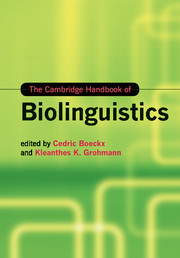Book contents
- The Cambridge Handbook of Biolinguistics
- The Cambridge Handbook of Biolinguistics
- Copyright page
- Dedication
- Contents
- Figures
- Tables
- Contributors
- Acknowledgements
- 1 Introducing the volume
- 2 Biolinguistics: A historical perspective
- 3 Biolinguistics yesterday, today, and tomorrow
- 4 The philosophical foundations of biolinguistics
- Part I Language development
- 5 (Evidence for) the language instinct
- 6 Sensitive phases in successive language acquisition: The critical period hypothesis revisited
- 7 Discovering word forms and word meanings: The role of phrasal prosody and function words
- 8 Luria’s biolinguistic suggestion and the growth of language
- 9 Parameters in language acquisition
- 10 Bilingualism beyond language: On the impact of bilingualism on executive control
- Part II Mind, brain, behavior
- Part III Language evolution
- Notes
- References
- Index
6 - Sensitive phases in successive language acquisition: The critical period hypothesis revisited
from Part I - Language development
Published online by Cambridge University Press: 05 May 2013
- The Cambridge Handbook of Biolinguistics
- The Cambridge Handbook of Biolinguistics
- Copyright page
- Dedication
- Contents
- Figures
- Tables
- Contributors
- Acknowledgements
- 1 Introducing the volume
- 2 Biolinguistics: A historical perspective
- 3 Biolinguistics yesterday, today, and tomorrow
- 4 The philosophical foundations of biolinguistics
- Part I Language development
- 5 (Evidence for) the language instinct
- 6 Sensitive phases in successive language acquisition: The critical period hypothesis revisited
- 7 Discovering word forms and word meanings: The role of phrasal prosody and function words
- 8 Luria’s biolinguistic suggestion and the growth of language
- 9 Parameters in language acquisition
- 10 Bilingualism beyond language: On the impact of bilingualism on executive control
- Part II Mind, brain, behavior
- Part III Language evolution
- Notes
- References
- Index
Summary
- Type
- Chapter
- Information
- The Cambridge Handbook of Biolinguistics , pp. 69 - 85Publisher: Cambridge University PressPrint publication year: 2013
- 24
- Cited by

